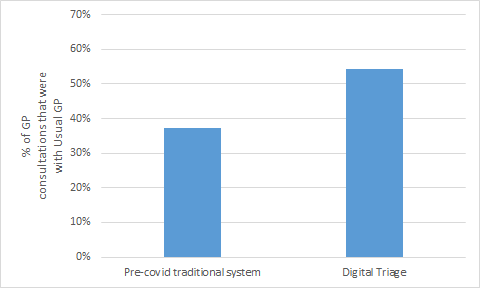I read this blog yesterday.
Also yesterday, I received some of the most positive patient feedback of my career. Lady in her 80s, consulted me 4 times over a couple of weeks about a painful problem with unclear diagnosis. Grateful++ for quality & continuity of care.
THREAD: https://twitter.com/prof_tweet/status/1311301408281559040">https://twitter.com/prof_twee...
Also yesterday, I received some of the most positive patient feedback of my career. Lady in her 80s, consulted me 4 times over a couple of weeks about a painful problem with unclear diagnosis. Grateful++ for quality & continuity of care.
THREAD: https://twitter.com/prof_tweet/status/1311301408281559040">https://twitter.com/prof_twee...
Each consultation started with her filling out an online form with a thorough description of the problem. I only saw her once. I dealt with the other forms with online messages or phone calls.
The article from @prof_tweet et al. seems to be knocking down a straw-man Babylon version of Digital primary care. This version bears little resemblance to what @NHSEngland & @MinalBakhai are promoting, or to what the vast majority of GPs are using Digital to do.
e.g. this quote, with its unspoken assumption that & #39;digital& #39; means a GP-at-Hand zero-continuity service.
My practice, among others, has used Digital Triage to facilitate an improvement in continuity. We& #39;ve focussed on providing continuity to the most vulnerable and complex patients, but continuity has improved for all groups.
Another big assumption in this quote. Might be true of some remote consulting models, but certainly not all. Locally we& #39;re careful to provide equity of access (via phone) to patients who can& #39;t contact us online. Nothing to stop a patient getting face-to-face contact if needed.
Digital approaches may well reduce health inequalities. Features of traditional systems - long phone waits, inability to get appointments, and needing half a day off work for a medication review - don& #39;t exactly help those in low-paid insecure employment, or single mothers.
Another assumption: only face-to-face interactions are & #39;real& #39; interactions. Is this true in our private lives: do telephone calls and WhatsApp do nothing to develop our relationships with family and friends? My elderly patient would disagree.
As @sib313 and others point out, digital triage doesn& #39;t mean that the consultation won& #39;t end up being face-to-face. This article conflates the mode of initial contact with the ultimate mode of the consultation.

 Read on Twitter
Read on Twitter






